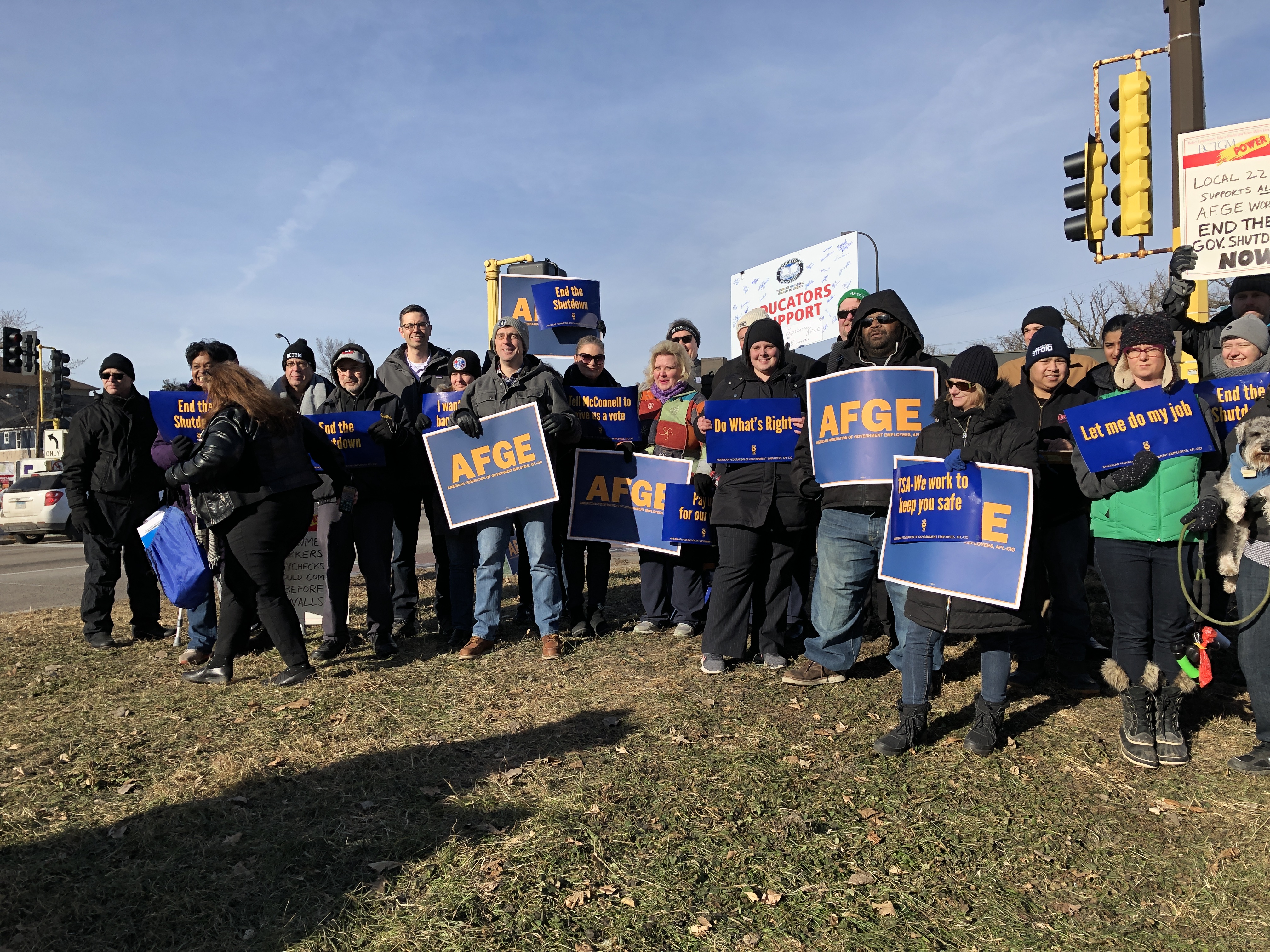

Share
At the intersection of E 54th St & Hiawatha Ave near the Veterans Affairs Health Care complex, American Federation of Government Employees (AFGE) members and supporters brought attention to the impact of the government shutdown for workers. AFGE represents approximately 670,000 federal employees nationwide in jobs ranging from Transportation Security Officers to food inspectors.
National vice president of AFGE’s 8th district Greg James explained that tomorrow is the first day workers won’t receive a paycheck.
Celia Hahn, local president for AFGE 899 representing transportation security officers, noted that “for the last couple of weeks its been people mentally preparing for not getting a paycheck…people are going to have to be making some tough choices.”
James elaborated saying, “I have heard stories where folks are having to make a choice between paying utilities or buying their prescription drugs.”
Hahn explained that those not receiving pay and still required to go to work need to pay for regular expenses like daycare and gas further stretching their finances and mental strain. In particular, TSA workers are some of the lowest paid in the federal government and typically live paycheck to paycheck. Turnover is already high, coupled with the current low morale, the work environment has become difficult.
Hahn reminds the public to, “Go gentle on your federal employees, if they are cranky there is a reason for it.”
online pharmacy buy metformin online no prescription
James would like the public to keep in mind that federal employees are devoted workers “I don’t know anywhere else in the world where employees show up for duty and not get a paycheck. They are dedicated individuals. ”
AFGE National President J. David Cox Sr stated that. “Thanks to this shutdown, 420,000 federal employees are still required to report to work but aren’t receiving any pay. More than 380,000 employees are locked out of work. These are real people, with real lives and real responsibilities. It’s time to end this shutdown, open the government, and get federal employees back on the job—with pay.”
Looking at the past reveals the depth and scope of the consequences of the shutdown. According to AFGE The 2013 shutdown lasted 16 days, costing taxpayers $24 billion. The day to day disruptions of everyday people was tremendous. For example, hundreds of cancer patients were prevented from enrolling in NIH clinical trials. Six thousand three hundred children were denied access to Head Start programs for up to 9 days. 1,200 EPA site inspections were canceled. 1,400 OSHA inspections to prevent workplace fatalities and injuries were stopped.
online pharmacy purchase valtrex online with best prices today in the USA
The situation now appears direr as the impacts are more widespread as the days mount. Access to worker stories are heightened through the hashtag #shutdownstories


online pharmacy purchase ventolin no prescription with best prices today in the USA
Unions are taking the fight to the courts.
online pharmacy purchase tenormin online with best prices today in the USA
On December 31, 2018, AFGE and Kalijarvi, Chuzi, Newman & Fitch (KCNF DC) sued the federal government on behalf of AFGE members and federal employees being forced to work without pay. The lawsuit alleges that the federal government is violating the law by requiring some federal employees to work without pay during a shutdown.
Wednesday the National Treasury Employees Union (NTEU) representing 150,000 government employees — including workers at the IRS, Customs and Border Protection, EPA, FDA, and other agencies — sued the government, saying the Trump administration had too broadly interpreted a law that requires certain federal employees to work without pay during shutdowns.
“If employees are working, they must be paid—and if there is no money to pay them, then they should not be working,” Tony Reardon, the national president of NTEU, said in a press release.
online pharmacy clomid for sale with best prices today in the USA
Senator Democrats are lending their support. Today U.S. Senator Tina Smith (D-Minn.)—along with 33 of her fellow Senate Democrats—called on the Trump Administration to direct federal agencies to work with contractors to provide back pay to compensate contractor employees for wages lost during the current shutdown.
“Contract workers and their families should not suffer the consequences of a shutdown that they did not cause,” wrote Sen. Smith and her colleagues to OMB. “Low-wage service contract workers perform jobs that are absolutely vital to the government, such as food service, security, and custodial work. Many of these workers live paycheck-to-paycheck, and cannot afford to pay their rent and other bills if the shutdown continues…After past shutdowns, contractor employees have generally not received back pay. In addition to our fight to protect federal workers who are being hurt by this shutdown, we are committed to righting this wrong for contractor employees.”
online pharmacy order prograf no prescription with best prices today in the USA
AFGE is asking workers and the public to take action by participating in various tactics listed on their website www.afge.org/shutdown.

